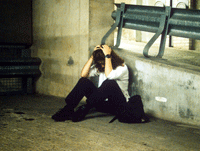
Homelessness agencies in London are facing a problem of middle-aged and older women with undiagnosed mental health problems sleeping rough but refusing offers of help.
Up to 25 such women are estimated to be sleeping rough in the capital. They do not misuse drugs or alcohol, but have either an undiagnosed mental health problem or one that is not severe enough to require sectioning.
The group is especially difficult to deal with because of their refusal to engage with any services or even to reveal anything about their background or identity but imply sleeping rough is a lifestyle choice.
Homelessness workers are concerned for their long-term health and safety.
The only time they are in a position to help is once their mental or physical health have deteriorated to a point where they are admitted to hospital, which may be too late.
Mental health services who have come into contact with some of these women have often concluded they are not unwell enough to be treated under the Mental Health Act 1983.
But pan-London outreach manager for homelessness agency Thames Reach, Tom Vincent, said it was not “rational” to want to sleep rough, nor has he ever come across any individual who actively wanted to do so.
“What we never seem to get from mental health services is that if it’s not a mental health problem, what is it being exhibited?” he said.
“There’s some suggestion that these women have some trauma in their past but because of the lack of family members or lack of background information it’s difficult to prove that.”
Richard Blakeway, homelessness adviser to London mayor Boris Johnson, said strategies to get the most entrenched rough sleepers into housing was proving successful with 45 of the original 205 still on the streets.
But to help groups such as these women there was a need for GPs and other primary care staff to go with outreach workers on visits over the long-term to observe the women, he said.
He also suggested that offers of help be made by different teams of workers in the hope of finding someone each woman could engage with.
Between April 2010 and March 2011, 3,975 people slept rough in London.
Of these 60% were new to the streets. Almost half were only seen on the streets once and almost three-quarters were seen for four months.
For a case study of one of these women and to have your say on their situation join the debate on CareSpace
Keep up to date with the latest developments in social care. Sign up to our daily and weekly emails
Related stories
How the 2012 Olympics will end rough sleeping



 Bournemouth, Christchurch and Poole
Bournemouth, Christchurch and Poole  Hampshire County Council
Hampshire County Council  Oxfordshire County Council
Oxfordshire County Council  South Gloucestershire Council
South Gloucestershire Council  Wokingham Borough Council
Wokingham Borough Council  Webinar: building a practice framework with the influence of practitioner voice
Webinar: building a practice framework with the influence of practitioner voice  ‘They don’t have to retell their story’: building long-lasting relationships with children and young people
‘They don’t have to retell their story’: building long-lasting relationships with children and young people  Podcast: returning to social work after becoming a first-time parent
Podcast: returning to social work after becoming a first-time parent  How managers are inspiring social workers to progress in their careers
How managers are inspiring social workers to progress in their careers  Workforce Insights – showcasing a selection of the sector’s top recruiters
Workforce Insights – showcasing a selection of the sector’s top recruiters  Unlocking independence: how ASDAN gives care leavers choice and control over their future
Unlocking independence: how ASDAN gives care leavers choice and control over their future 

 Facebook
Facebook X
X LinkedIn
LinkedIn Instagram
Instagram
Comments are closed.